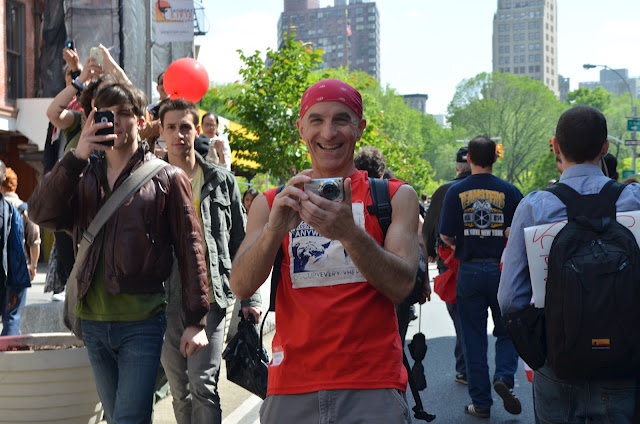 Mickey Z., May Day -- May 1, 2012. Photo: Stacy Lanyon
Mickey Z., May Day -- May 1, 2012. Photo: Stacy Lanyon
May 10, 2012 -- I've been involved in activism and writing and public speaking for a long time, and I’ve seen potential movements come and go. So when I saw the announcement for Occupy Wall Street, I was skeptical.
After 2008, when a lot of lefties fell for the “Hope and Change,” I didn’t think I was going to see the revolution in my lifetime. I got to Wall Street one week after the Occupation began. That’s when I began to realize it wasn’t going away, and I just needed to see it for myself.
I walked into the park, and there was an immediate, palpable sense that this was different than anything else I'd ever seen before. The best way I could phrase it is that they were beginning to create an alternative form of human culture. The genius of the 99% versus 1% is that it invited everyone in.
As someone who appreciates anarchist principles, I liked the idea of the consensus and the horizontal and the non-hierarchical structures. As I walked through with my camera, I found myself weeping. I said, “I can’t believe this is happening.” Somebody recognized me and said, “Can I interview you.” In the interview, I basically said, “I had to see it myself, and this is the real deal.”
Since then, whether it’s Zuccotti or Union Square or related events, I’ve been coming down a minimum of once a week, but usually like three or four times a week, and I’ve now made friendships and connections that I would imagine are going to last forever. I've interacted with people that, if this movement didn’t happen, I wouldn’t have had a chance to meet.
What drew me in was my lifelong interest in activism. What kept me in was the sense of community and solidarity and endurance. When they took away the amplification, they created the People’s Mic. When they took away the electrical outlets, they brought in the bikes. That staying one step ahead of the state or the corporations that own the state, I found to be mesmerizing.
It’s also taught me to check my ageism because living in America, you kinda generalize about people of a certain age -- high school age, college age, this generation -- and I’ve met some of the most amazing, creative, savvy, passionate people from that age group. It’s a pleasure to say that I was dead wrong. Probably in one way or another -- without saying the word -- I’ve been begging people to occupy for 15 or 20 years, and now that this is happening, I can’t see any reason why I wouldn’t throw myself into it because this is what I’ve been waiting for.
The essence of what I’ve always done is try to introduce people to a sense of urgency. I would tell them that 80 percent of the forests are gone or 90 percent of the large fish in the ocean are gone. What’s happening on the planet today is not a minor crisis. It’s basically now or never.
As I said earlier, I didn’t believe that there was going to be a movement of this size and scope happening in my lifetime, and now once I’ve seen it happening, what’s important to me is that I firmly believe, with all my heart, that this is our last best chance to begin creating the type of change that could save all life on the planet. I don’t mean to be overly dramatic, but literally, the eco system is at the tipping point.
I believe all of the other issues are crucial. It would be great if we had single-payer and if the rich paid more taxes and so on, but my focus has always been the bigger picture, and what’s wonderful about OWS is that they have the smaller working groups, everyone has their individual passions, but there’s a sense of the big picture. This is why I’m doing talks, to urge people that if they’re skeptical, come down, meet the occupiers, go to the meetings and recognize that the reason this is so important is because this is our last best chance, and as cliché as it sounds, this movement, this revolution is what the planet has been waiting for, and we can’t let this moment pass.
I’m not overly focused on what the endgame is going to be because a successful movement is a process. It’s an enduring and evolving process. But needless to say, there are some things that have to be changed right away, and as I said earlier, the destruction of the eco system is something that we need to reverse as soon as possible. There are so many visions of how I can imagine a better world, but initially it's one in which a movement like this grows, more and more people get involved, even people from the 1%, and they recognize the urgency and act the way that people act in emergencies.
If you’re standing on a street corner and a three-year-old kid begins to wander toward the curb, we all know instinctively what to do, and what we need to do is address the world crisis with the same sense of urgency. We don’t need five hundred meetings to rush out and grab that kid, and I think if we recognize the scope of the crisis, things will begin to fall into place.
What that’s going to look like is up in the air, but if we don’t recognize the emergency and act accordingly, what it’s going to look like is very ugly. The vision I see right now is that this movement grows, people recognize the urgency, and they act to address the urgency.
This article first appeared: At The Heart Of An Occupation











